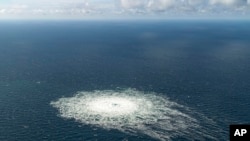European Union foreign policy chief Josep Borrell said Wednesday that all indications are that leaks from two Nord Stream natural gas pipelines in the Baltic Sea “are the result of a deliberate act.”
“We will support any investigation aimed at getting full clarity on what happened and why, and will take further steps to increase our resilience in energy security,” Borrell said in a statement. “Any deliberate disruption of European energy infrastructure is utterly unacceptable and will be met with a robust and united response.”
The U.S. State Department said late Tuesday that Secretary of State Antony Blinken discussed the situation with Danish Foreign Minister Jeppe Kofod and that the United States “remains united with our allies and partners in our commitment to promoting European energy security.”
White House national security adviser Jake Sullivan tweeted that the U.S. is supporting efforts to investigate the apparent sabotage.
Denmark’s defense minister Morten Bodskov is due to discuss the matter with NATO Secretary General Jens Stoltenberg in Brussels on Wednesday.
“I’m not going to speculate on the cause” of the leaks, replied White House press secretary Karine Jean-Pierre to questions about the incident Tuesday, adding that she had nothing to report on whether the United States had been requested by European officials to help determine the cause of the ruptures.
'An act of sabotage'
The 1,222-kilometer-long Nord Stream 1 pipeline has been, until recently, a major source of gas for Germany. Nord Stream 2, which is 1,234 kilometers in length, has yet to go into commercial operation.
"We have established a report and the crime classification is gross sabotage," the Swedish national police said Tuesday, announcing a preliminary investigation into possible sabotage of Nord Stream 1.
“There are three leaks, and therefore it is difficult to imagine that it could be accidental," said Danish Prime Minister Mette Frederiksen Tuesday.
“We see clearly that this is an act of sabotage – an act which likely means a further step of escalation of the situation in Ukraine,” concurred Polish Prime Minister Mateusz Morawiecki.
Frederkisen and Morawiecki spoke in Gloeniow in Poland at the opening ceremony for Baltic Pipe, part of a Polish plan to reduce its energy dependence on Russia. The line will connect Poland to Norwegian gas fields through Denmark.
“No option can be ruled out right now,” said Kremlin spokesman Dmitry Peskov, regarding the possibility of sabotage, adding that the leaks are a cause for concern.
Russia closed Nord Stream 1 earlier this month, ostensibly for maintenance work.
The majority owner of the network’s operator, Nord Stream AG, is Gazprom, a Russian state-owned energy company.
"The destruction that occurred on the same day simultaneously on three strings of the offshore gas pipelines of the Nord Stream system is unprecedented,” said NordStream AG in a statement. "It is not yet possible to estimate the timing of the restoration of the gas transport infrastructure.”
"The biggest leak is spreading bubbles a good kilometer in diameter. The smallest is creating a circle about 200 meters” in diameter, according to a statement from the Danish armed services, which included photographs of the leaks off the island of Bornholm.
Powerful blasts recorded Monday
Scientists in Europe say seismographs on Monday recorded powerful blasts in the Baltic Sea, the same day the two gas pipelines dropped pressure.
"There was a spike and then regular noise," said Josef Zens, a spokesman for the German geological research center GFZ. "We cannot say if that could be gas streaming out."
“Once is happenstance. Twice is coincidence. The third time it’s enemy action,” wrote Bloomberg Opinion columnist Javier Blas, quoting the late British author Ian Fleming.
“The leaks are more likely a message: Russia is opening a new front on its energy war against Europe. First, it weaponized gas supply, halting shipments, including via the Nord Stream pipeline. Now, it may be attacking the energy infrastructure it once used to ship its energy,” said Blas, author of The World for Sale: Money, Power and the Traders Who Barter the Earth’s Resources.
Amid much speculation on social media about who might have sabotaged Nord Stream there is no credible evidence of a likely culprit or motive. Analysts and amateurs on Twitter contend the Russians may have deployed divers or unmanned submersible vehicles to poke holes in the pipelines.
The leaks are a result of a “terrorist attack” and “an act of aggression” against the European Union, declared Mykhailo Podolyak, an advisor to the Ukrainian presidential office.
Some anonymous accounts on Twitter, parroting Russian state media, sought to blame Washington and Kyiv. On social media on Tuesday, a video clip from early February recirculated of Joe Biden vowing to “bring an end” to the Nord Stream 2 project if Russia invaded Ukraine.
The Kremlin has stated that if Western Europe wants Russian gas, it should end sanctions against Moscow imposed following Russia’s invasion of Ukraine seven months ago.
“My understanding is the leaks will not have a significant impact on Europe's energy resilience,” Secretary Blinken said in Washington.
“This just drives home the importance of our efforts to work together to get alternative gas supplies to Europe and to support efforts to reduce gas consumption and accelerate true energy independence by moving to a clean energy economy,” a White House National Security Council spokesperson told VOA.
While the impact to Europe ahead of the winter as a result of the loss of the pipelines remains to be seen, the trio of leaks poses an immediate hazard to wildlife and maritime navigation.
The gas could suffocate animals and is an explosion threat to passing ships, according to environmental groups.
Contributors include Patsy Widakuswara at the White House; Nike Ching at the State Department, and Chris Hannas in Washington. Some information in this report came from Reuters.







